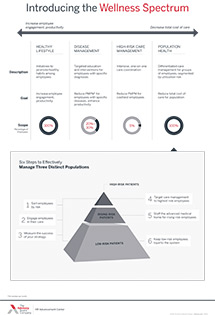Auto logout in seconds.
Continue LogoutFor years, coconut oil has enjoyed a reputation as a health-conscious food choice. Most experts now agree that reputation is undeserved—but one adjunct Harvard University professor is going much further, arguing the oil amounts to "pure poison."
Help your employees promote healthy habits—regardless of the newest diet fads
Karin Michels, an adjunct epidemiology professor at Harvard's T.H. Chan School of Public Health, in July delivered a lecture in German that has received a great deal of media attention. Her lecture, which was called "Coconut Oil and Other Nutritional Errors" and translated by Business Insider Deutschland, argued that coconut oil is "pure poison."
According to the New York Times' "Well," few experts take "such a harsh view against coconut oil," but many have questioned its recent popularity as a health food.
Coconut oil's history
Coconut oil has been used as both a cooking and beauty agent for centuries, Vox reports, and over the years it has gone in and out of vogue as a health food. The oil initially fell out of favor for cooking in the 1950s because of its high concentration of saturated fat, which has been linked to heart disease. But by 2016, polling showed that 70% of Americans consider the oil a health-conscious choice.
Coconut oil's heart-healthy reputation stems in part from a pair of papers published in 2003 under the supervision of Marie-Pierre St-Onge, a professor of nutrition at Columbia University. The papers showed that eating and cooking with "medium chain fatty acids," such as those found in coconut oil, can help dieters lose weight.
According to Vox, a 2008 study also by St-Onge likely furthered the product's popularity as a healthy food. The study found people who ate an oil containing medium chain triglycerides lost more weight than those who consumed olive oil.
The findings led to claims that coconut oil could help with weight loss—even though St-Onge warned that the data had been "extrapolated very liberally," adding, "I've never done one study on coconut oil."
What the research shows
The American Heart Association (AHA) in 2017 sought to clear up the confusion by issuing an advisory statement stating that coconut oil increases "bad" LDL cholesterol, which thickens arterial walls, making them hard and narrow, and therefore should be avoided.
Alice Lichtenstein, a professor of nutrition science and policy at Tufts University said, "There's virtually no data to support the hype" around coconut oil. While there's little research in general on the health effects of coconut oil in people, Lichtenstein said, "There appears to be no independent benefit of consuming it."
Walter Willett, a professor of epidemiology and nutrition at Harvard, wrote in a blog post on the topic, "Fat in the diet, whether it's saturated or unsaturated, tends to nudge HDL levels up, but coconut oil seems to be especially potent at doing so."
Is coconut oil actually "poison?"
Despite the harsh rhetoric recently deployed to describe coconut oil, Willett took a more moderate view. While he agreed that "we really don't have any evidence of long-term health benefits" of coconut oil, he said the oil lies "somewhere in the middle of the spectrum in terms of types of fats." He argued, "It's probably better than partially hydrogenated oils, [which are] high in trans fats, but not as good as the more unsaturated plant oils that have proven health benefits, like olive and canola oil."
In addition, according to "Well," a recent large study showed lauric acid—commonly found in coconut oil—didn't seem to increase the risk of heart disease as much as other saturated fatty acids, such as palmitic acid, which is found in butter.
A general rule, Willett said coconut oil is fine in smaller amounts, but other oils are better for day-to-day use. "It's not that you have to absolutely avoid coconut oil, but rather limit coconut oil to where you really need that special flavor, like for Thai food or for baking a special dessert," he said (Wischhover, Vox, 8/23; Rabin/Egan, "Well," New York Times, 8/21; Drayer/Nedelman, CNN, 8/22).
Help your employees promote healthy habits—regardless of the newest diet fads
Programs aimed at promoting healthy habits among employees are likely to lead to improved employee engagement and productivity—but they're unlikely to reduce the total cost of care. To do that, you'll need to take a population health approach.
Don't miss out on the latest Advisory Board insights
Create your free account to access 1 resource, including the latest research and webinars.
Want access without creating an account?
You have 1 free members-only resource remaining this month.
1 free members-only resources remaining
1 free members-only resources remaining
You've reached your limit of free insights
Become a member to access all of Advisory Board's resources, events, and experts
Never miss out on the latest innovative health care content tailored to you.
Benefits include:
You've reached your limit of free insights
Become a member to access all of Advisory Board's resources, events, and experts
Never miss out on the latest innovative health care content tailored to you.
Benefits include:
This content is available through your Curated Research partnership with Advisory Board. Click on ‘view this resource’ to read the full piece
Email ask@advisory.com to learn more
Click on ‘Become a Member’ to learn about the benefits of a Full-Access partnership with Advisory Board
Never miss out on the latest innovative health care content tailored to you.
Benefits Include:
This is for members only. Learn more.
Click on ‘Become a Member’ to learn about the benefits of a Full-Access partnership with Advisory Board
Never miss out on the latest innovative health care content tailored to you.


